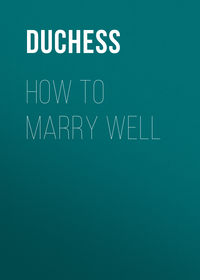 полная версия
полная версияFaith and Unfaith: A Novel
She goes even farther, and insinuates it may assist digestion, which so impresses Mrs. Redmond that Arthur forthwith finds himself at liberty to "tuck into" (his own expression) the raspberry jam without let or hindrance.
This marvellous behavior on the part of the bony Scot tells greatly in her favor, so far as the children go. They tell each other later on that she can't be altogether an unpleasant sort, Master Arthur being specially loud in her praise. He even goes so far as to insinuate that Miss Broughton would never have said as much; but this base innuendo is sneered down by the faithful children who have loved and lost her. Nevertheless, they accept their fate; and, after a week or two, the new-comer gains immense ground, and is finally pronounced by her pupils to be (as she herself would probably express it) "no' that bad." Thus, Miss McGregor becomes governess at the vicarage, vice Georgie Broughton promoted.
To be married at once, without any unnecessary delay, is Dorian's desire; and when, with some hesitation, he broaches the subject to Georgie, to his surprise and great content he finds her quite willing to agree to anything he may propose. She speaks no word of reluctance, appears quite satisfied with any arrangement he or Clarissa may think proper, makes no shrinking protest against the undue haste. She betrays no shyness, yet no unseemly desire for haste. It seems to her a matter of perfect indifference. She is going to be married, sooner or later, as the case may be. Then why not the sooner?
This is, perhaps, the happiest time of her life. She roams all day among the flowers and in the pleasure-grounds, singing, laughing, talking gayly to any one she may meet at Gowran, where, since Miss McGregor's advent, she has been. When at length it is finally settled that the marriage is to take place next month, she seems rather pleased than otherwise, and is openly delighted at the prospect held out to her by Dorian of so soon seeing, with her own eyes, all the foreign lands and romantic scenes her fancy has so often depicted.
Just now, even as the tiny clock inside the room is chiming four, Dorian is standing outside the low French window of Miss Peyton's morning-room, and, leaning half in, half out of it, is conversing with her, alone. Georgie, for the time being, is lost to sight, – happy, somewhere, no doubt, in the warm sunshine she loves so well.
"Clarissa," he is saying, in a somewhat halting fashion, – he is coloring hotly, and is looking as uncomfortable as a man can look, which is saying a good deal, – "look here."
An ignominious break-down.
"I'm looking," says Clarissa, somewhat unkindly; "and I don't see much."
"Well, 'tis this, you know. You won't think it queer of me, will you?"
"I won't; I promise that. Though I haven't the faintest idea whether I shall or not."
"When she is getting her things, her trousseau, – I want her to have every earthly thing she can possibly fancy," he says, at last, desperately. "Can't you manage that for me? Do; and make any use you like of this."
He flings a cheque-book into her lap through the open window as he speaks.
"She shall have everything she wants," says Clarissa; "but I don't think" – taking up the book – "we shall require this."
"Nevertheless, keep it. You must want it; and don't mention me in the matter at all. And – look here again – what do you think she would like as a wedding-present?"
Of course he has given her long ago the orthodox engagement ring, the locket, the bracelet, and so forth.
"Why don't you ask her?" says Miss Peyton.
"Because the other day she said she adored surprises. And I am sure she doesn't care about being asked what she likes."
"You have your mother's diamonds."
"Oh, of course" – airily – "all my mother's things will be hers; that goes without telling; but I hate old rubbish. I want to give her something from myself to wear on her marriage morning. Don't you see? or is it that you grow imbecile in your old age, my good Clarissa?"
"No; it only means that you are growing extravagant in your dotage, my good Dorian. Well, mention something, that I may object to it."
"Emeralds, then?"
"No: papa has set his heart on giving her those."
"Rubies?"
"Oh, nothing red: they would not suit her."
"Opals?"
"Too unlucky, she would die or run away from you."
"Pearls? But of course," – quickly: "why did I not think of them before?"
"Why, indeed? They will be charming. By the by, Dorian, have you told Lord Sartoris of your engagement?"
Dorian's brow darkens.
"No. He has been from home, you know, either in Paris or the Libyan desert, or somewhere. He only turned up again two days ago. Seen him since?"
"He was here, but I was out. Have you seen him?"
"Well, yes, – at a distance."
"Dorian, there is certainly something wrong between you and Lord Sartoris. I have noticed it for some time. I don't ask you what it is, but I entreat you to break through this coldness and be friends with him again." She stoops towards him, and looks earnestly into his face. He laughs a little.
"I'm tremendous friends with him, really," he says, "if you would only try to believe it. I think him no end of a good fellow, if slightly impossible at times. When he recovers from the attack of insanity that is at present rendering him very obnoxious, I shall be delighted to let by-gones be by-gones. But until then – "
"You will tell him of your engagement?"
"Perhaps: if occasion offers."
"No, not perhaps. Go to-day, this very evening, and tell him of it."
"Oh, I can't, really, you know," says Mr. Branscombe, who always finds a difficulty in refusing any one anything.
"You must," – with decision: "he surely deserves so much at your hands."
"But how few of us get our deserts!" says Dorian, still plainly unimpressed.
"Well, then, I think you should speak of it openly to him, – if only for Georgie's sake."
"For her sake?" He colors again, and bites his lips. "If you really think I owe it to her, of course I shall do it, however distasteful the task may be; though I cannot see how it will benefit her."
"He is your uncle; you will wish your own family to receive her?"
"I dare say you are right," says Branscombe, with a shrug. "People always are when they suggest to you an unpleasant course."
"What is unpleasant now? How can there be anything to distress any one on such a heavenly day as this?" cries the soft petulant voice he loves so well, calling to them across a flower-bed near.
Springing over it, she comes up to the window, and, leaning her elbows on the sill close to him, laughs gayly up into his face.
"There shall be nothing to distress you, at all events, my 'amber witch,'" returns he, gayly, too. "Come, show me once more these gardens you love so well."
A promise with Dorian is not made of pie-crust: though sorely against his will, he goes up to Hythe after dinner to acquaint his uncle formally of his approaching marriage. The evening is calm and full of rest and quiet, a fit ending to the perfect day that has gone before:
"The long day wanes, the broad fields fade; the night —The sweet June night – is like a curtain drawn.The dark lanes know no faintest sound, and whiteThe pallid hawthorn lights the smooth-bleached lawn;The scented earth drinks from the silent skiesSoft dews, more sweet than softest harmonies."Going through the woods that lie upon his right, he walks silently onward, impressed by the beauty of the swift-coming night, yet too restless in mind to take in all its charms that are rich enough to satisfy a hungry soul. A soft wind is sighing; beneath its touch the young and tender branches are swaying lightly to and fro; all the "feathery people of mid-air" are preening their downy plumage and murmuring sleepy hymns ere sinking to their rest.
Scarce a sound can be heard, save the distant lowing of cattle, and the drowsy drone of a slumberous bee as it floats idly by. The very sound of Dorian's footsteps upon the soft grass can be distinctly heard, so deadly is the calm that ushers in the night; when, lo! from out some thicket, the nightingale, —
"Who is silent all day long;But when pale eve unseals her clear throat, loosesHer twilight music on the dreaming boughsUntil they waken" —bursts into song. High and clear and exquisite rise the notes one above the other, each vying in beauteous harmony with the last, until one's very heart aches for love and admiration of their sweetness.
Dorian, though oppressed with many discordant thoughts, still pauses to listen, until silence following upon the passionate burst of melody, he draws his breath quickly and goes on to Hythe, and into the dining-room there, where he finds Lord Sartoris still over his wine.
He is sitting at the head of the long table, looking strangely solitary, and very much aged, considering the short time that has elapsed since last he left Pullingham.
"So you are home again, Arthur," says Dorian, coldly, but with apparent composure. They have not been face to face since that last meeting, when bitter words, and still more bitter looks, had passed between them.
Now, letting the quickly spoken sentence take the place of a more active greeting, they nod coolly to each other, and carefully refuse to let their hands touch.
"Yes," says Sartoris, evenly; "I returned two days ago. Business recalled me; otherwise I was sufficiently comfortable where I was to make me wish to remain there."
"And Constance, is she quite well?"
"Quite well, thank you. Your other cousins desired to be remembered to you. So did she, of course."
A pause, prolonged and undesirable.
"You will take some claret?" says Sartoris, at last, pushing the bottle towards him.
"No, thank you; I have only just dined. I came up to-night to tell you what I dare say by this you have heard from somebody else; I am going to be married on the 9th of next month."
Lord Sartoris turns suddenly to confront him.
"I had not heard it," he says, with amazement. "To be married! This is very sudden." Then, changing his tone, "I am glad," he says, slowly, and with an unmistakable sneer, "that at last it has occurred to you to set that girl right in the eyes of the world. As a man of honor there was no other course left open to you."
"To whom are you alluding?" asks Branscombe, growing pale with anger, an ominous flash betraying itself in his gray eyes.
"I hope I understand you to mean to offer full, though tardy, reparation to Ruth Annersley."
With an effort Branscombe restrains the fierce outburst of wrath that is trembling on his lips.
"You still persist, then, in accusing me of being accessory to that girl's disappearance?"
"You have never yet denied it," exclaims Sartoris, pushing back his glass, and rising to his feet. "Give me the lie direct, if you can, – if you dare, – and I will believe you."
"I never will," returns Dorian, now thoroughly roused, – "never! If my own character all these past years is not denial enough, I shall give no other. Believe what you will. Do you imagine I shall come to you, like a whipped school-boy, after every supposed offence, to say, 'I did do this,' or, 'I did not do that'? I shall contradict nothing, assert nothing: therefore judge me as it may please you. I shall not try to vindicate my actions to any living man."
His tone, his whole bearing, should have carried conviction to the hearts of most men; but to the old lord, who has seen so much of the world in its worst phases, – its cruelties and falsehoods, – and who has roughed it so long among his fellowmen, faith, in its finer sense, is wanting.
"Enough," he says, coldly, with a slight wave of his hand. "Let us end this subject now and forever. You have come to tell me of your approaching marriage; may I ask the name of the lady you intend making your wife?"
"Broughton; Georgie Broughton," says Branscombe, briefly.
"Broughton, – I hardly fancy I know the name; and yet am I wrong in thinking there is a governess at the vicarage of that name?"
"There was. She is now staying with Clarissa Peyton, I am to be married to her, as I have already told you, early next month."
"A governess!" says Sartoris. There is a world of unpleasant meaning in his tone. "Really," – with slow contempt, – "I can hardly congratulate you on your tastes! You, who might have chosen your wife almost anywhere, can find nothing to suit you but an obscure governess."
"I don't think there is anything particularly obscure about Georgie," replies Dorian, with admirable composure, though he flushes hotly. "Have you ever seen her? No? Then, of course, you are not in a position to judge of either her merits or demerits. I shall thank you, therefore," – surveying his uncle rather insolently, from head to heel, – "to be silent on the subject."
After a slight pause, he turns again to Sartoris, and, forcing him to meet his gaze, says haughtily, —
"May we hope you will be present at our wedding, my lord?"
"I thank you, no. I fear not," returns the older man, quite as haughtily. "I hope to be many miles from here before the end of next week."
Dorian smiles unpleasantly.
"You will at least call upon Miss Broughton before leaving the neighborhood?" he says, raising his brows.
At this Sartoris turns upon him fiercely, stung by the apparent unconcern of his manner.
"Why should I call?" he says, his voice full of indignant anger. "Is it to congratulate her on her coming union with you? I tell you, were I to do so, the face of another woman would rise before me and freeze the false words upon my lips. To you, Dorian, in my old age, all my heart went out. My hopes, my affections, my ambitions, began and ended with you. And what a reward has been mine! Yours has been the hand to drag our name down to a level with the dust. Disgrace follows hard upon your footsteps. Were I to go, as you desire, to this innocent girl, do you imagine I could speak fair words to her? I tell you, no! I should rather feel it my duty to warn her against entering a house so dishonored as yours. I should – "
"Pshaw!" says Branscombe, checking him with an impatient gesture. "Don't let us introduce tragedy into this very commonplace affair. Pray don't trouble yourself to go and see her at all. In your present mood, I rather think you would frighten her to death. I am sorry I intruded my private matters upon you: but Clarissa quite made a point of my coming to Hythe to-night for that purpose, and, as you know, she is a difficult person to refuse. I'm sure I beg your pardon for having so unwarrantably bored you."
"Clarissa, like a great many other charming people, is at times prone to give very unseasonable advice," says Sartoris, coldly.
"Which, interpreted, means that I did wrong to come. I feel you are right." He laughs faintly again, and, taking up his hat, looks straight at his uncle. He has drawn himself up to his full height, and is looking quite his handsomest. He is slightly flushed (a dark color that becomes him), and a sneer lies round the corners of his lips. "I hardly know how to apologize," he says, lightly, "for having forced myself upon you in this intrusive fashion. The only amends I can possibly make is to promise you it shall never occur again, and to still further give you my word that, for the future, I shall not even annoy you by my presence."
So saying, he turns away, and, inclining his head, goes out through the door, and, closing it gently after him, passes rapidly down the long hall, as though in haste to depart, and, gaining the entrance-door, shuts it, too, behind him, and breathes more freely as he finds the air of heaven beating on his brow.
Not until he has almost reached Sartoris once more does that sudden calm fall upon him that, as a rule, follows hard upon all our gusts of passion. The late interview has hurt him more than he cares to confess even to himself. His regard – nay, his affection – for Sartoris is deep and sincere; and, though wounded now, and estranged from him, because of his determination to believe the worst of him, still it remains hidden in his heart, and is strong enough to gall and torture him after such scenes as he has just gone through.
Hitherto his life has been unclouded, – has been all sunshine and happy summer and glad with laughter. Now a dark veil hangs over it, threatening to deaden all things and dim the brightness of his "golden hours."
"He who hath most of heart knows most of sorrow." To Dorian, to be wroth with those he loves is, indeed, a sort of madness that affects his heart, if not his brain.
He frowns as he strides discontentedly onward through the fast-falling night: and then all at once a thought comes to him – a fair vision seems to rise almost in his path – that calms him and dulls all resentful memories. It is Georgie, – his love, his darling! She, at least, will be true to him. He will teach her so to love him that no light winds of scandal shall have power to shake her faith. Surely a heart filled with dreams of her should harbor no miserable thoughts. He smiles again; his steps grow lighter! he is once more the Dorian of old; he will – he must – be, of necessity, utterly happy with her beside him during all the life that is to come.
Alas that human hopes should prove so often vain!
CHAPTER XXVII
"Tis now the summer of your youth; time has not cropt the roses from your cheek, though sorrow long has washed them." —The Gamester.
The wedding – a very private one – goes off charmingly. The day breaks calm, smilingly, rich with beauty. "Lovely are the opening eyelids of the morn."
Georgie, in her wedding garments, looking like some pale white lily, is indeed "passing fair." She is almost too pallid, but the very pallor adds to the extreme purity and childishness of her beauty, and makes the gazer confident "there's nothing ill can dwell in such a temple." Dorian, tall and handsome, and unmistakably content, seems a very fit guardian for so fragile a flower.
Of course the marriage gives rise to much comment in the county, Branscombe being direct heir to the Sartoris title, and presumably the future possessor of all his uncle's private wealth. That he should marry a mere governess, a positive nobody, horrifies the county, and makes its shrug its comfortable shoulders and give way to more malicious talk than is at all necessary. With some, the pretty bride is an adventuress, and, indeed, – in the very softest of soft whispers, and with a gentle rustling of indignant skirts, – not altogether as correct as she might be. There are a few who choose to believe her of good family, but "awfully out-at-elbows, don't you know;" a still fewer who declare she is charming all round and fit for anything; and hardly one who does not consider her, at heart, fortunate and designing.
One or two rash and unsophisticated girls venture on the supposition that perhaps, after all, it is a real bonâ fide love-match, and make the still bolder suggestion that a governess may have a heart as well as other people. But these silly children are pushed out of sight, and very sensibly pooh-poohed, and are told, with a little clever laugh, that they "are quite too sweet, and quite dear babies, and they must try and keep on thinking all that sort of pretty rubbish as long as ever they can. It is so successful, and so very taking nowadays."
Dorian is regarded as an infatuated, misguided young man, who should never have been allowed out without a keeper. Such a disgraceful flinging away of opportunities, and birth, and position, to marry a woman so utterly out of his own set! No wonder his poor uncle refused to be present at the ceremony, – actually ran away from home to avoid it. And – so – by the by, talking of running away, what was that affair about that little girl at the mill? Wasn't Branscombe's name mixed up with it unpleasantly? Horrid low, you know, that sort of thing, when one is found out.
The county is quite pleased with its own gossip, and drinks innumerable cups of choicest tea over it, out of the very daintiest Derby and Sèvres and "Wooster," and is actually merry at the expense of the newly-wedded. Only a very few brave men, among whom is Mr. Kennedy, who is staying with the Luttrels, give it as their opinion that Branscombe is a downright lucky fellow and has got the handsomest wife in the neighborhood.
Towards the close of July, contrary to expectation, Mr. and Mrs. Branscombe return to Pullingham, and, in spite of censure, and open protest, are literally inundated with cards from all sides.
The morning after her return, Georgie drives down to Gowran, to see Clarissa, and tell her "all the news," as she declares in her first breath.
"It was all too enchanting," she says, in her quick, vivacious way. "I enjoyed it so. All the lovely old churches, and the lakes, and the bones of the dear saints, and everything. But I missed you, do you know, – yes, really, without flattery, I mean. Every time I saw anything specially desirable, I felt I wanted you to see it too. And so one day I told Dorian I was filled with a mad longing to talk to you once again, and I think he rather jumped at the suggestion of coming home forthwith; and – why, here we are."
"I can't say how glad I am that you are here," says Clarissa. "It was too dreadful without you both. I am so delighted you had such a really good time and were so happy."
"Happy! – I am quite that," says Mrs. Branscombe, easily. "I can always do just what I please, and there is nobody now to scold or annoy me in any way."
"And you have Dorian to love," says Clarissa, a little gravely, she hardly knows why. It is perhaps the old curious want in Georgie's tone that has again impressed her.
"Love, love, love," cries that young woman, a little impatiently. "Why are people always talking about love? Does it really make the world go round, I wonder? Yes, of course I have Dorian to be fond of now." She rises impulsively, and, walking to one of the windows, gazes out upon the gardens beneath. "Come," she says, stepping on to the veranda; "come out with me. I want to breathe your flowers again."
Clarissa follows her, and together they wander up and down among the heavy roses and drooping lilies, that are languid with heat and sleep. Here all the children of the sun and dew seem to grow and flourish.
"No daintie flowre or herbe that growes on grownd,No arborett with painted blossoms drestAnd smelling sweete, but there it might be fowndTo bud out faire and throwe her sweete smels al arownd."Dorian, coming up presently to meet his wife and drive her home, finds her and Clarissa laughing gayly over one of Georgie's foreign reminiscences. He walks so slowly over the soft green grass that they do not hear him until he is quite close to them.
"Ah! you have come, Dorian," says Dorian's wife, with a pretty smile, "but too soon. Clarissa and I haven't half said all we have to say yet."
"At least I have said how glad I am to have you both back," says Clarissa. "The whole thing has been quite too awfully dismal without you. But for Jim and papa I should have gone mad, or something. I never put in such a horrid time. Horace came down occasionally, – very occasionally, – out of sheer pity, I believe; and Lord Sartoris was a real comfort, he visited so often; but he has gone away again."
"Has he? I suppose our return frightened him," says Branscombe, in a peculiar tone.
"I have been telling Clarissa how we tired of each other long before the right time," says Georgie, airily, "and how we came home to escape being bored to death by our own dulness."
Dorian laughs.
"She says what she likes," he tells Clarissa. "Has she yet put on the dignified stop for you? It would quite subdue any one to see her at the head of her table. Last night it was terrible. She seemed to grow several inches taller, and looked so severe that, long before it was time for him to retire, Martin was on the verge of nervous tears. I could have wept for him, he looked so disheartened."
"I'm perfectly certain Martin adores me," says Mrs. Branscombe, indignantly, "and I couldn't be severe or dignified to save my life. Clarissa, you must forgive me if I remove Dorian at once, before he says anything worse. He is quite untrustworthy. Good-by, dearest, and be sure you come up to see me to-morrow. I want to ask you ever so many more questions."









